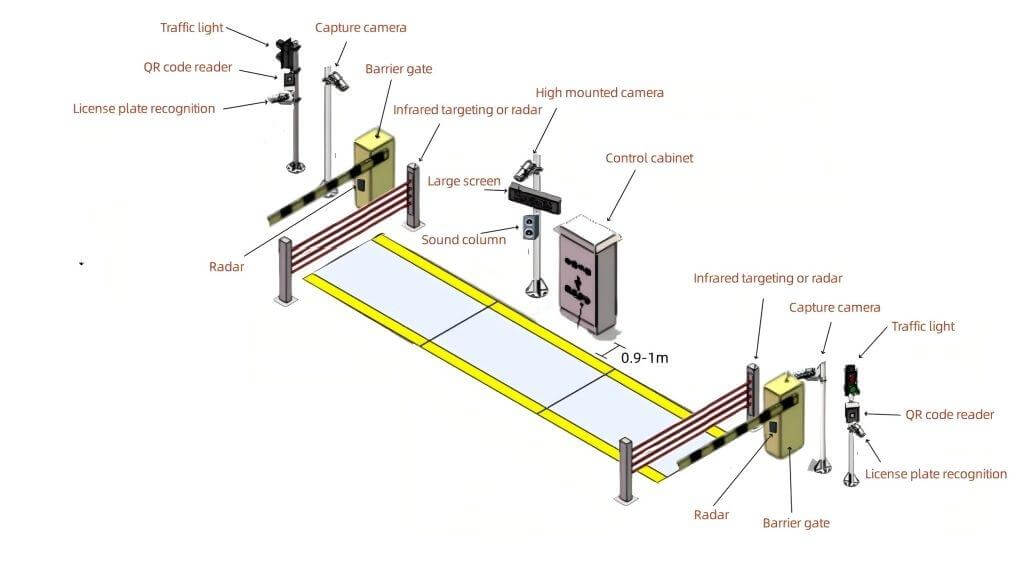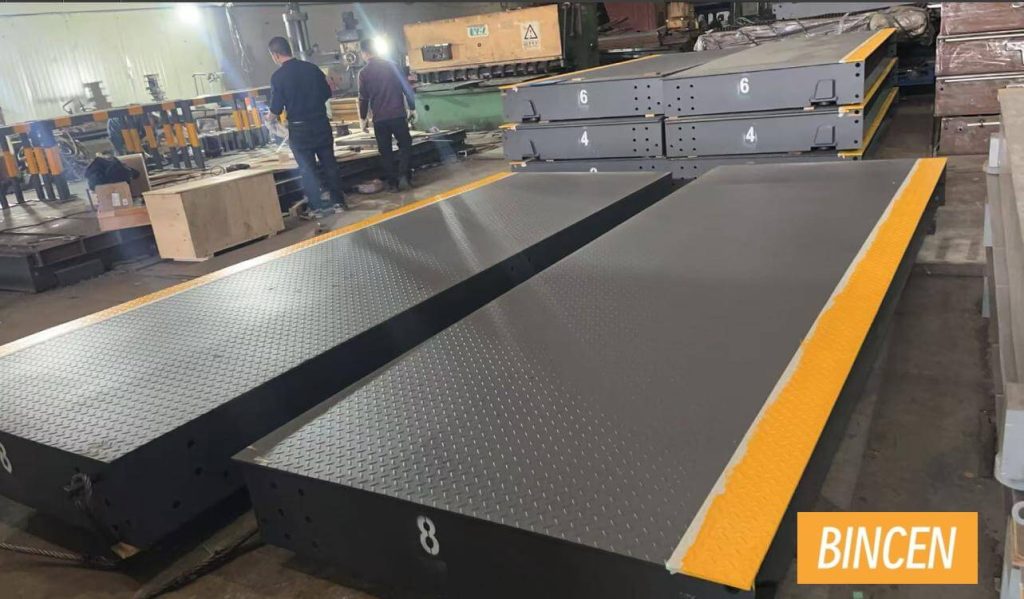How Accurate are Portable Truck Scales? – Explained in Detail
In industries such as logistics, construction, mining, and agriculture, truck weighing is a critical step to ensure operational efficiency and regulatory compliance. As demand for flexibility and convenience continues to grow, Portable Truck Scales are becoming increasingly popular among businesses. However, a frequently asked question is: How accurate are portable truck scales?
This article provides a comprehensive analysis of the accuracy of portable truck scales, the factors that affect their performance, a comparison with fixed weighbridges, and practical tips on how to improve weighing precision, helping you make an informed decision.
Part 1. What is a Portable Truck Scale?
A portable truck scale is a weighing system that can be quickly deployed and easily relocated, primarily used to measure the total weight or individual axle weight of trucks. It typically consists of multiple weighing pads (axle scales) that are lightweight and compact in design, making it ideal for temporary weighing scenarios, such as:
- Construction sites
- Farms and orchards
- Highway enforcement checkpoints
- Remote mining areas
- Temporary logistics stations
Its greatest advantage lies in the fact that it does not require any permanent infrastructure, allowing for fast and efficient weighing truck wherever needed.
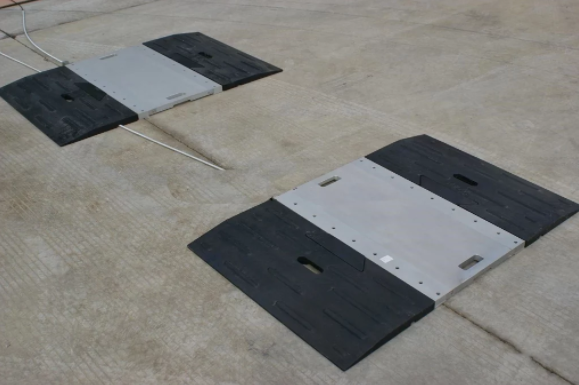
Part 2. How Accurate are Portable Truck Scales?
When it comes to weighing trucks, accuracy is a top priority, especially in industries where truck overloading, underloading, or inaccurate measurements can result in compliance violations, financial losses, or operational inefficiencies.
According to industry standards and real-world performance data, the typical weighing accuracy of a portable truck scale falls within the range of ±1% to 3% of full scale (FS). This means that for a truck with a full-scale load capacity of 50 tons, the possible deviation in measurement could be anywhere from ±500 kg to ± 1500 kg.

Part 3. Factors that Affect the Accuracy of Portable Truck Scales
While portable truck scales can provide highly reliable measurements, their accuracy is influenced by multiple environmental, operational, and technical factors. Understanding these variables can help users optimize weighing performance and reduce measurement errors.
Below are the key factor that affect truck scale accuracy:
Sensor Technology: Most high-quality portable truck scales are equipped with advanced strain gauge load cells or digital sensors that ensure reliable and repeatable readings.
Proper Setup Conditions: Accuracy is highly dependent on installation environment. The ground should be flat, hard, and level—such as concrete or well-compacted asphalt. Uneven surfaces can lead to unbalanced loads and affect readings.
Correct Calibration: Regular calibration using certified test weights or professional services ensures that the scale maintains its performance over time.
Temperature and Environmental Conditions: While modern systems are designed to withstand harsh environments, extreme temperature changes, moisture, or dust may influence sensor stability or cause minor drift in readings.
Operator Handling and Driving Habits: Operator handling significantly affects weighing accuracy. Misaligned wheels or vehicle movement can cause errors. Proper driver training ensures centered positioning and stillness during weighing, reducing inaccuracies.
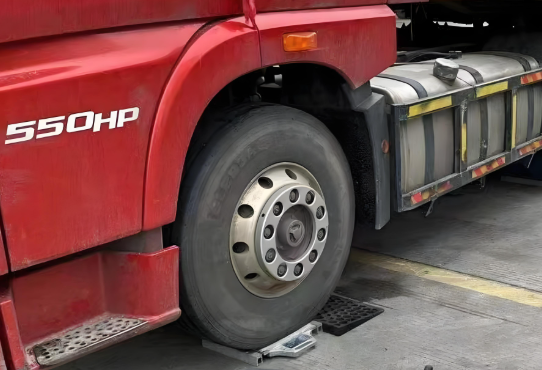
Part 4. How to Improve the Accuracy of Portable Truck Scales?
To optimize performance and ensure accurate portable truck scales, the following best practices should be followed:
Use on Stable, Level Ground
Always place the weighing pads on a flat, hard, and stable surface, such as concrete or asphalt. Avoid using the scale on soft or uneven terrain like mud, sand, or gravel, as this can cause imbalance and distort readings.
Perform Zero Calibration Before Each Use
Before weighing any vehicle, make sure to zero the scale with no load on the pads. This step eliminates any drift caused by previous use or environmental changes and ensures that each weighing session starts from a true zero point.
Keep the Scale Clean
Regularly inspect and clean the weighing pads and sensors. Dirt, rocks, or debris lodged under or around the scale can interfere with load cell readings and reduce accuracy. A clean surface allows the system to function without obstruction.
Schedule Routine Maintenance and Calibration
To maintain long-term accuracy, the scale should be professionally calibrated at regular intervals and inspected for wear or damage. This includes checking load cells, cables, and connectors for any issues that may affect performance.
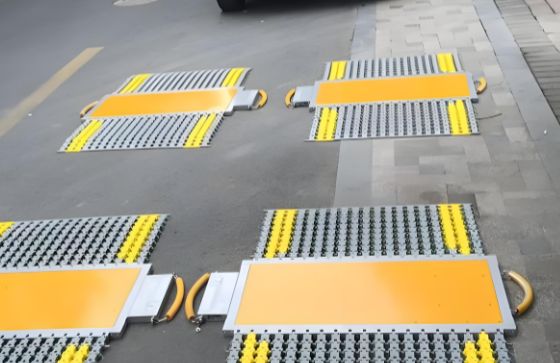
Part 5. Which Industries Are Best Suited for Portable Truck Scales?
Portable truck scales offer great flexibility and are particularly beneficial in industries where mobility, temporary setup, and efficient vehicle weight monitoring are essential. Below are some industries where portable truck scales are especially useful:
Construction Industry
In the construction sector, portable truck scales are ideal for temporary weighing needs at job sites. They allow for efficient weighing of materials being transported to and from the site, ensuring that trucks do not exceed weight limits that could damage roads or violate transport regulations.
These scales are often deployed to weigh aggregate, concrete, and debris as part of construction material logistics.
Agriculture
Portable truck scales are widely used in agriculture for seasonal weighing of farm products such as grain, livestock, and produce.
They allow farmers to weigh harvests directly in the field or orchard, reducing transportation time to a permanent weighbridge. They are also helpful for purchase or sale transactions where accurate weight measurement is crucial for pricing and inventory.
Transportation Enforcement
In traffic enforcement, portable truck scales help authorities quickly set up checkpoints to monitor and enforce overweight vehicle regulations.
These scales are used to prevent trucks from carrying excessive loads that could damage infrastructure or pose a safety risk. They are often used in temporary locations, such as highways, construction zones, or remote areas with limited access to permanent weighbridges.
Energy & Mining
The energy and mining industries often operate in remote or off-grid locations, making portable truck scales a vital tool for weighing material transported from mining sites, such as ore, coal, and minerals.
They allow companies to monitor the weight of shipments without the need for permanent infrastructure, especially in areas like quarries or distant mining regions where accessibility and installation are challenging.
Part 6. Choose High-Precision Portable Truck Scales – Bincen Portable Truck Scale
Bincen offers the portable truck scale, a high-precision, flexible, and durable weighing device designed to meet the demands of various industries for accurate weighing and easy use.
It provides precise weighing results in both dynamic and static environments, making it ideal for use in road transportation, construction, agriculture, environmental protection, and other sectors.
Whether it’s used for axle load detection of transport trucks or trade settlement between enterprises, the Bincen portable axle load scale provides the perfect solution.
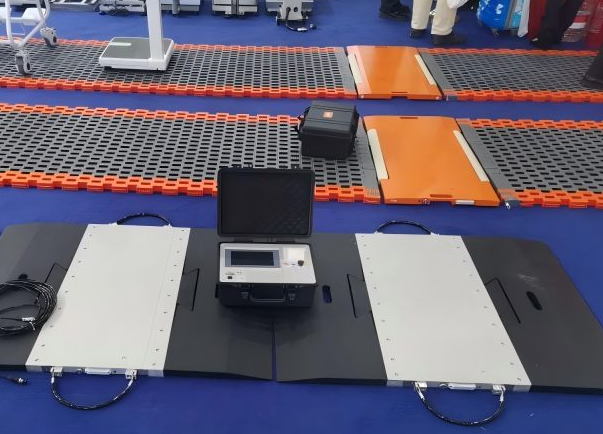
Key Features of Bincen Portable Truck Scale:
High Precision Weighing:
- Static weighing accuracy: ±0.5% (full scale)
- Dynamic weighing accuracy: ±1%~3% (accuracy varies depending on the weighing speed)
- Meets precision requirements across various industries, including logistics, law enforcement, and commercial settlement.
Portability and Mobility:
- Compact design: Small footprint, no need for foundation installation, allowing for quick deployment.
- High mobility: The device can be easily moved to different locations for use, ideal for temporary weighing needs.
- Wireless technology: Enhances electromagnetic resistance, ensuring stable weighing results in various environments.
Dual Mode Weighing:
- Dynamic and Static Weighing: Capable of handling both stationary and moving vehicles, providing comprehensive weighing data.
- Axle-by-Axle Weighing: Supports axle-by-axle weighing, accurately recording the weight of each axle, accommodating multi-axle vehicles.
Real-Time Data Display:
- Displays date, time, truck number, ticket number, battery voltage, and vehicle speed.
- Can print detailed weighing tickets, including data such as date, truck number, axle weight, total vehicle weight, overload information, and more.
Easy Installation and Maintenance:
- Bincen provides complete technical support and installation guides, ensuring customers can easily set up and commission the equipment.
- Clear video tutorials and remote assistance services are available to ensure smooth installation and operation.
Bincen’s portable truck scale excels in high precision, ease of operation, and flexible deployment, making it the ideal choice for weighing needs across various industries. Whether for traffic enforcement or industrial weighing, Bincen offers efficient, one-stop solutions for all your weighing requirements.
Summary: Are Portable Truck Scales Reliable?
The answer is: Under proper usage, portable truck scales are absolutely reliable. They provide sufficiently accurate weighing results in most scenarios, especially for industries that prioritize convenient deployment and high-efficiency weighing.
To ensure stable performance and accurate weighing, it’s crucial to choose a reliable brand and use the scale according to specifications.

